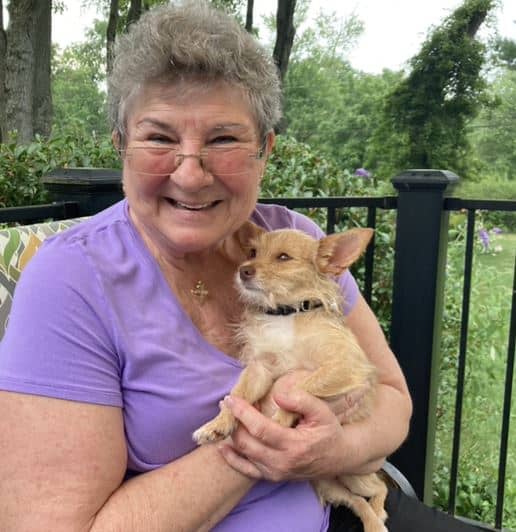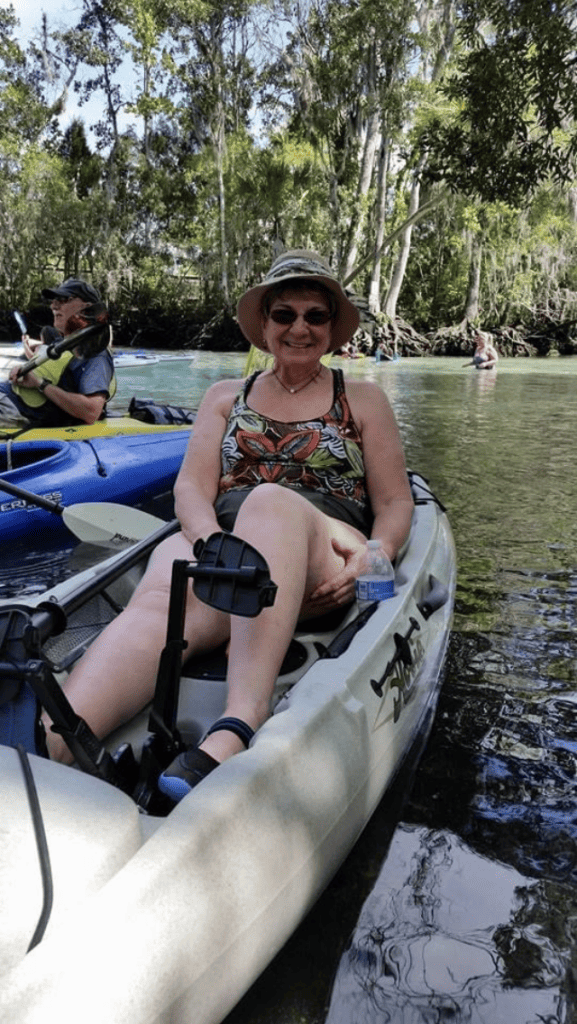
In late 2013, Janet was adamant something was wrong with her breast despite a mammogram showing nothing unusual. “My doctor said nothing was wrong, but my nipple itched. I knew something wasn’t right,” she said. Janet’s doctor sent her for another mammogram, which showed a spot. A biopsy soon confirmed the spot was cancer: Janet had ERPR+, HER2-negative breast cancer.
“My mother had breast cancer when she was 45,” Janet said. “She was a survivor. Her cancer did not return, it did not metastasize.” Janet was told her own breast cancer was stage 0. She opted to have a mastectomy and underwent surgery in early 2014.
After her surgery, Janet was put on tamoxifen but developed stroke-like symptoms and ultimately stopped it. In hindsight, she regrets the decision. “I remember my oncologist telling me I needed to be on something, but since I had such a bad reaction to it, I kind of poo-pooed that idea,” she said.
Two years later, Janet felt a lump in the same location as her first tumor. “It was biopsied right away. I had a PET scan, and it showed the cancer had come back. It was the same cancer, but now it was in my tailbone and my pelvis,” Janet said. “I was stage 4 (metastatic), and of course, there is no cure for stage 4 breast cancer.”
It was hard for Janet to grasp that the cancer had gone from stage 0 to stage 4 in just two years’ time. “It was not good. I thought, no, this is not happening,” she recalled. At the time, her care team told her she had maybe two years to live. “I was so naïve. I had no idea what was going on, even though I’d been around cancer a lot.” Janet had lost her brother to lung cancer when he was 29, and she was a caretaker for her best friend, who passed away from breast cancer 10 years earlier.
Since her stage 4 diagnosis, Janet has been on several therapies and has participated in clinical trials. She recently had a brain MRI and a PET scan, which showed she is stable. She’s experienced a lot of side effects, including avascular necrosis in her hip socket.
Janet is on a fixed income and unable to work. She was a field engineer in the construction field for many years but became disabled after a car accident. Recently, with prices for everything rising, she found herself with outstanding bills. “I didn’t want to ruin my credit. I’m 72. I fought hard to get the credit I have,” she said. While Janet receives food and financial assistance from agencies near her home, she needed more help.
“I have books full of paperwork for when I apply for financial help with different places, but with Komen, it was so easy to apply for help,” Janet said. “I was able to get the financial help I needed and get caught up on my bills. People don’t understand how overwhelming the costs for treatment and drugs are when you’re metastatic.”

Janet has surrounded herself with a caring community. Her daughter lives nearby and her sister visits often to help out. But it’s the metastatic community that has really helped her. Janet belongs to metastatic support groups, which allow her to find solace with women who understand what she’s going through. She encourages anyone who has been diagnosed with breast cancer to get connected to others. “No matter what stage, get connected with a group because you’re so scared and you don’t know what’s coming next,” she said. “But when somebody can walk you through it, then, it’s not so scary.”
Statements and opinions expressed are that of the individual and do not express the views or opinions of Susan G. Komen. This information is being provided for educational purposes only and is not to be construed as medical advice. Persons with breast cancer should consult their healthcare provider with specific questions or concerns about their treatment.
Breast cancer screening and early detection play an important role in your health. Screening tests can help detect breast cancer at an early stage when the chances of survival are highest.



